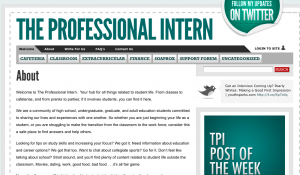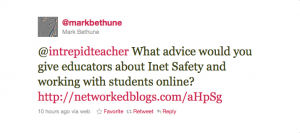With so many self- professed social media experts trolling Twitter, bogus blogs and other fake websites abound on the Web, it is becoming more and more difficult to know who is a real person looking for authentic connection, who is a Bot, and who is in it to make a quick buck through blatant self-promotion. There are of course strategies to employ on Twitter to differentiate between legitimate people and scams, but sometimes it is really a tough call. This recognition between the fake and the real is what I want to share with you today. In hopes that you can not only help me solve this current investigation, but more importantly to start a conversation about how we can help our students make sense of all the characters on the web.
It started like this. I received this email this morning:
Hello!
I was reading your blog today and saw that you accept guest contributions. I would love the opportunity to write for you!
Currently I write for The Professional Intern (www.professionalintern.com) and you can find samples of my writing there. I’ve got a few great post ideas that I think would mesh well with your readers, but I would be willing to write whatever you need.
I promise only original content with relevant links. Are you interested?
Thanks!
Let’s explore the clues as to why this is a scam:
- This person did not sign their name.
- Did not address me by name
- Has never comment on my blog before
- Did not name which of my blogs they want to write for
- I have never said I “accept guest contributions”
Now let’s look at why it could be real:
- The Blog looks legit
- Descriptive About Page
- I Googled long pieces of text and they all feed back to this blog
- There is a Twitter account that looks new, but legit
Tough call right?
Dear Michael,
I hope you don’t mind that I have decided to share this experience publicly on my blog. Blogging is a public act and if you want to write for my blog and have read any of my work, you know that I think sharing, openness and transparency are vital to successful community building. If The Professional Intern is a legitimate blog, and I really want it to be, then I hope that this post can be the place we start a dialogue. You see, I would actually love guest writers to share their thoughts here, but I see this space as an extension of who I am as an educator and as a person. It is very personal and important to me. While I would love as big of an audience as possible, I am not interested in rise to the top blogging schemes. I want to write honestly and creatively about things that are important to me as a teacher. I hope that I foster deep thinking and engagement with my tight knit group of readers. If I were to ask anyone to write for my blog, I would hope that they would be from this aforementioned family of readers.
It is not that I am saying no to your request, but I find it odd that you want to write for a blog you have never commented on before. I think that guest blogging and merging of networks and cross-pollination of ideas are fantastic. I just hope you understand my trepidation. I have worked hard to build my blog and do not feel comfortable opening it up to just anyone. For all I know I could be writing this heartfelt explanation to a Bot designed to generate emails for reasons I don’t understand. I could be writing a letter to spam. Now that would be embarrassing. But not really, Michael, because I have faith that you could be real, and if you are real then I hope this post will make you want to write on Intrepid Teacher even more.
Here’s the deal: If you are a real person who writes for The Professional Intern and still want to share some ideas here on Intrepid Teacher, please leave me a comment about why you chose this blog as a place to share your work, send me a list of possible ideas that you think my readers would enjoy, and let’s go from there. If this relationship does blossom, I hope that I could return the favor and post some ideas on your blog as well. If you are a specter of the web, then…well…I could just stop now.
Trying desperately to be sincere,
Jabiz
What do you think? Is this legit?If it is fake, why go through all of this? What is there to gain from setting up fake blogs and Twitter? Is there a lesson here for students in recognizing Internet tomfoolery? If this is real, then was I offensive? What if Michael is just student learning? Will this interaction help him understand why someone might not see him as a person online? Is that okay? Am I over thinking this again? Talk amongst yourself…Hopefully we can have a fun conversation in the comments



